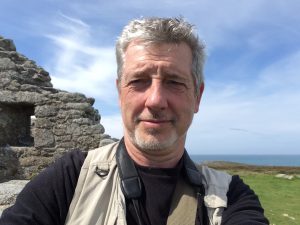Graduate Ecologists and Their Exploitation in Ecological Consultancy – By Marcus Kohler MCIEEM
BLOG
At the CIEEM 2019 AGM, I raised my concerns over this issue and the culture within some of our ecological consultancies of expecting junior staff to work excessive hours in the field during summer contracts and their first jobs. I have been asked to share my thoughts. Recruitment interviews for my company have brought this matter repeatedly to my attention and it’s a practice that, as well as often being illegal and dangerous, is undermining the profession. Of the cases of which I am aware, it is both small and also some of the big boys who are doing this. It simply has to stop
Ecology is not the first profession to exploit its junior staff, look at the hours that young doctors and lawyers undertake. However, it’s nothing short of being a toxic culture that breeds poor practice, poor mental health, limited professional development, the capacity for serious mistakes, token ecological appraisal and in our profession especially, the chance of causing a serious accident and endangering lives. Our governing body want to address this but we need your support in the process, and that has to come from two directions, both top-down and bottom up.
There are some real horror stories out there. I have been told of graduate staff undertaking five continuous days of dawn and dusk surveys. Some quotes:
“We had to go and do nocturnal surveys and we were expected to drive two or more hours to a different site and then undertake a dawn survey.”
”We also had to go and do nocturnal surveys that were as far as three hours away and not have a hotel booked, so we had to drive straight back after.”
“During peak season we’d be out almost every night of the week, and still be expected to produce reports during this time. We’d still have to go and do reptile/PEAs [Preliminary Ecological Assessments] during the day as well.”
This is exploitative, dangerous and totally illegal. Any of these graduates could make a case under the Working Time Directive against the consultancy concerned (although note that ‘temporary’ staff have far less protection), but this is a very tough call for a new person keen to develop and who is unlikely to know this level of work is not the ‘norm’. So, we have to address this and support graduates in the process and stamp out this culture. The Working Time Directive sets out the right to fair working conditions, limiting working to 48 hours a week, and crucially, ensuring sufficient rest time between work, especially when working anti-social hours. If you are reading this and subject to similar timetable abuse and fully employed, then rest assured you would have a very strong case at any employment tribunal.
Consultancies could argue that this enables efficiency and a viable pricing mechanism, and on one level I agree. Exploitation has always been the cash baby of the unscrupulous. It drives down the value of the profession and the delivery of effective, informed ecology. It has no place within an industry based around principles of sustainability and well-being.
What I have also found is that there is very little training by some consultancies. Another quote:
“At my last job we only went out with a senior ecologist for our first survey, then we did all the rest by ourselves. This includes PEAs and Preliminary Roost Assessments, of which I had no prior experience. This means we’d be doing PRAs without a licenced bat ecologist, which I did bring up to the senior ecologist but he said it was fine unless we found a bat.“
This is so wrong on so many levels. How can it be expected for graduates to develop with so little training? How can the consultancy be confident of the quality of the work? These practices could easily lead to criminal breaches of wildlife legislation and are certainly not contributing to sustainable development process. Do these consultancies care? Is a graduate ecologist going to know how to find a bat in a building or recognise or even understand that a bird on the site is a Schedule 1 specially protected species?
The effects on graduates are multiple: de-motivation, extreme tiredness, social isolation and can easily lead to depression and long-term health issues. At the very least, such an absence of professional support and practice can lead to a cynical approach to the profession. And frankly, who could blame them?
We need to do more to address this practice, and many agree, but the question levelled is how? I would suggest the following:
Enable a whistle-blower culture. Yes, I hate that term too, but perhaps we need to provide a forum for graduates to know they are not alone, and that they do need training and support and are absolutely entitled to safe working practice. We need to bring those undermining the profession to book in order to address this.
If you are a manager within such a culture, and the directors are not listening to your concerns, then share them with your professional body. If we don’t address this soon, it is only a matter of time before some young ecologist driving whilst exhausted is involved in an awful accident. It’s in all our interests to end this culture.
Everyone who values ecology, values the importance of our work, values the rights of young ecologists to a fruitful and challenging career wants this practice addressed. The consultancies that continue to do this are driving the values and the effectiveness of the profession down, and exploiting young talented graduates in the process.
CIEEM has published its Good Working Practices document, which is available via the MY CIEEM area of the website and shortly to be updated. Read this and consider how your employer is doing.
Marcus Kohler MCIEEM
Director, MKA Ecology
 Marcus Kohler is a multi-disciplined ecologist who works with all terrestrial fauna. His company, MKA Ecology (a CIEEM Registered Practice), have just celebrated their 21st anniversary, and he works in their main Office in Cambridgeshire with a great team of fellow ecologists. Marcus has over 30 years’ experience in consultancy, but has also worked in international conservation managing the UNDP/GEF Migratory Soaring Birds project in the Middle East and North east Africa as Flyways officer for Birdlife International. He has travelled widely and led wildlife tours across Europe, Africa, the Middle East and Asia and has a particular interest in Madagascar. As well as ecological consultancy, Marcus has advised on eco-tourism development and best practice and was also heavily involved in developing the best practice guidance for Wildlife and wind farms in the middle East and East Africa. He enjoys sport, following Crystal Palace FC, and was also a football coach for ten years and set up and managed a new grassroots club which now trains over 100 children and also ran an award-winning children’s Wildlife Club. Marcus Is an active mentor for CIEEM.
Marcus Kohler is a multi-disciplined ecologist who works with all terrestrial fauna. His company, MKA Ecology (a CIEEM Registered Practice), have just celebrated their 21st anniversary, and he works in their main Office in Cambridgeshire with a great team of fellow ecologists. Marcus has over 30 years’ experience in consultancy, but has also worked in international conservation managing the UNDP/GEF Migratory Soaring Birds project in the Middle East and North east Africa as Flyways officer for Birdlife International. He has travelled widely and led wildlife tours across Europe, Africa, the Middle East and Asia and has a particular interest in Madagascar. As well as ecological consultancy, Marcus has advised on eco-tourism development and best practice and was also heavily involved in developing the best practice guidance for Wildlife and wind farms in the middle East and East Africa. He enjoys sport, following Crystal Palace FC, and was also a football coach for ten years and set up and managed a new grassroots club which now trains over 100 children and also ran an award-winning children’s Wildlife Club. Marcus Is an active mentor for CIEEM.
Blog posts on the CIEEM website are the views and opinions of the author(s) credited. They do not necessarily represent the views or position of CIEEM. The CIEEM blog is intended to be a space in which we publish though-provoking and discussion-stimulating articles.
